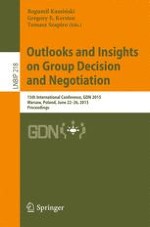2015 | OriginalPaper | Buchkapitel
The Choice of Voting Rules Based on Preferences over Criteria
verfasst von : Hannu Nurmi
Erschienen in: Outlooks and Insights on Group Decision and Negotiation
Aktivieren Sie unsere intelligente Suche, um passende Fachinhalte oder Patente zu finden.
Wählen Sie Textabschnitte aus um mit Künstlicher Intelligenz passenden Patente zu finden. powered by
Markieren Sie Textabschnitte, um KI-gestützt weitere passende Inhalte zu finden. powered by
